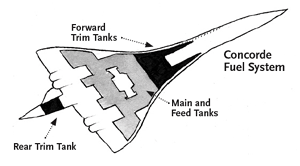Supersonic Dream
|  |
Student Handout
|
Fueling the Burn
 Fuel
is used to fly and balance planes. Burning fuel changes the mass of the plane.
The data set in this activity includes the average take-off weight and the
average amount of fuel burned per hour for seven aircraft. Are all commercial
aircraft designed to burn fuel at the same rate? How much fuel is burned per
passenger carried? Do this activity to find out.
Fuel
is used to fly and balance planes. Burning fuel changes the mass of the plane.
The data set in this activity includes the average take-off weight and the
average amount of fuel burned per hour for seven aircraft. Are all commercial
aircraft designed to burn fuel at the same rate? How much fuel is burned per
passenger carried? Do this activity to find out.
Procedure
You will be calculating the changes in aircraft mass as fuel is burned after 1,
2, and 3 hours of flight. Use the data from the "Fuel Burn" chart on your
"Aircraft Specifications" handout for this part of the activity. Use the formulas listed on your "Aircraft Specifications" handout to
determine the mass of fuel burned per hour (round to whole numbers) and the
change in mass after 1, 2, and 3 hours of flight. (Although the mass of the
plane changes after each hour of flight, thus affecting the fuel burn rate, to
simplify your calculations you will be assuming the fuel burn rate remains
constant throughout the flight.) Enter your answers into the chart. Present your results as a line graph on your "Graphing Mass Change"
handout. Use the formulas on your "Aircraft Specifications" handout to find the mass
of fuel burned after 3 hours and the percent change in mass of the plane after
3 hours of flight. Record the results in the chart below.
Aircraft Type |
Mass of Fuel
Burned After
3 Hours (kg) |
Percent
Mass
Change |
Boeing 747-100 |
|
|
Boeing DC-10-3 |
|
|
Concorde |
|
|
Airbus 300-600 |
|
|
Boeing 727-200 |
|
|
Boeing 737-4 |
|
|
BAE 146-2 |
|
|
Now consider airplane fuel efficiency per passenger. Use the data from the
"Passenger Count" chart on your "Aircraft Specifications" handout for this part
of the activity. Use the formula on your "Aircraft Specifications" handout to calculate how
many gallons of fuel are used per passenger for a flight from London to New
York. Enter your answers into the chart. Create a bar graph to represent the last column's results in the "Passenger
Count" table.
Questions
Write
your answers on a separate sheet of paper.
What might you infer from your graph that shows how airplane masses change
during a three-hour flight? Why is it important to consider how fast an aircraft burns fuel? How might
extra weight impact fuel burn? Why is it important to consider the percent change in mass of an aircraft in
flight? What affect does the initial mass of the plane have on the percent mass
change due to fuel burn? Describe three factors that have an effect on aircraft fuel consumption. Which plane is most fuel efficient per passenger? Which is least fuel
efficient per passenger?
|